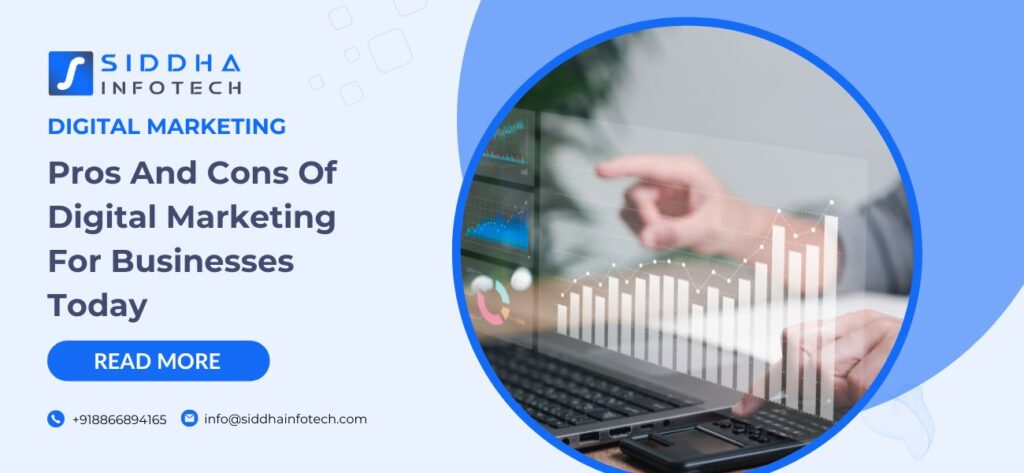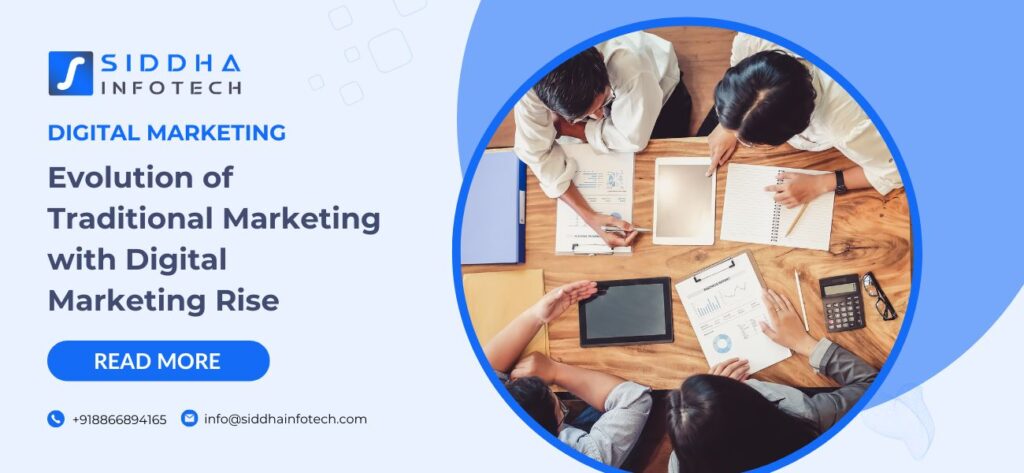Pros and Cons of Digital Marketing for Businesses Today
In today's fast-paced, technology-driven world, digital marketing has become an essential component of any successful business strategy. From small startups to large corporations, companies are leveraging the power of the internet to reach and engage with their target audiences. However, like any business strategy, digital marketing comes with its own set of advantages and disadvantages. In this comprehensive guide, Siddha Infotech explores the pros and cons of digital marketing for businesses today, helping you make informed decisions about your marketing efforts.
The Pros of Digital Marketing
1. Global Reach
One of the most significant advantages of digital marketing is its ability to reach a global audience. Traditional marketing methods, such as print and television advertising, are often limited by geographical boundaries. In contrast, digital marketing allows businesses to connect with potential customers anywhere in the world, expanding their reach and opening up new markets.
2. Cost-Effectiveness
Digital marketing is often more cost-effective than traditional marketing methods. Online advertising platforms, such as Google Ads and social media ads, allow businesses to set their own budgets and only pay for the clicks or impressions they receive. This level of control and flexibility makes it easier for businesses of all sizes to manage their marketing expenses.
3. Measurable Results
One of the key benefits of digital marketing is the ability to track and measure the performance of campaigns in real-time. Tools like Google Analytics and social media insights provide detailed data on website traffic, user behavior, and conversion rates. This data allows businesses to make data-driven decisions, optimize their marketing strategies, and achieve better results.
4. Targeted Advertising
Digital marketing enables businesses to target specific demographics, interests, and behaviors. Platforms like Facebook, Instagram, and LinkedIn offer advanced targeting options that allow businesses to reach their ideal customers with precision. This level of targeting helps to maximize the effectiveness of marketing campaigns and increase return on investment (ROI).
5. Enhanced Engagement
Digital marketing provides numerous opportunities for businesses to engage with their audience. Social media platforms, email marketing, and content marketing allow businesses to create meaningful interactions with their customers. These interactions can help to build brand loyalty, foster customer relationships, and drive conversions.
6. Flexibility and Adaptability
The digital landscape is constantly evolving, and digital marketing allows businesses to adapt quickly to changes. Whether it's updating a website, launching a new ad campaign, or responding to customer feedback, digital marketing provides the flexibility needed to stay competitive in a rapidly changing market.
The Cons of Digital Marketing
1. High Competition
The accessibility of digital marketing means that virtually every business has an online presence, leading to high competition. Standing out in a crowded digital space can be challenging, and businesses must invest in creative and strategic marketing efforts to capture their audience's attention.
2. Dependence on Technology
Digital marketing relies heavily on technology and internet connectivity. Technical issues, such as website downtime or server problems, can disrupt marketing efforts and result in lost opportunities. Additionally, businesses must stay up-to-date with the latest technological advancements to remain competitive.
3. Privacy Concerns
The use of personal data in digital marketing has raised significant privacy concerns among consumers. Businesses must navigate complex regulations, such as the General Data Protection Regulation (GDPR), and ensure that they are collecting and using data ethically and transparently. Failing to do so can damage a brand's reputation and result in legal repercussions.
4. Time-Consuming
Effective digital marketing requires a significant time investment. Creating high-quality content, managing social media accounts, optimizing for search engines, and analyzing data are all time-consuming tasks. Small businesses, in particular, may struggle to allocate the necessary resources to maintain an effective digital marketing strategy.
5. Rapidly Changing Algorithms
Search engines and social media platforms frequently update their algorithms, impacting how content is ranked and displayed. Keeping up with these changes and adjusting marketing strategies accordingly can be challenging. Businesses must stay informed about the latest algorithm updates to ensure their content remains visible and relevant.
6. Potential for Negative Feedback
The open nature of the internet means that businesses are exposed to public feedback, both positive and negative. Negative reviews, comments, and social media backlash can harm a brand's reputation. Businesses must be prepared to handle negative feedback professionally and use it as an opportunity to improve their products and services.
Maximizing the Benefits of Digital Marketing
To make the most of digital marketing, businesses should focus on several key strategies:
-
Develop a Comprehensive Strategy: A well-defined digital marketing strategy is crucial for success. This strategy should outline goals, target audience, key messages, and the channels that will be used to reach the audience. Regularly reviewing and updating the strategy ensures that it remains aligned with business objectives.
-
Invest in Quality Content: Content is the backbone of digital marketing. Creating high-quality, valuable content that addresses the needs and interests of the target audience can help businesses build trust and authority in their industry. Blog posts, videos, infographics, and social media posts are all effective forms of content.
-
Utilize Data and Analytics: Data-driven decision-making is essential in digital marketing. By analyzing data from various sources, businesses can gain insights into customer behavior, campaign performance, and market trends. This information can be used to optimize marketing strategies and achieve better results.
-
Engage with the Audience: Building relationships with customers is key to long-term success. Engaging with the audience through social media, email marketing, and customer service helps to foster loyalty and encourages repeat business. Responding to comments, messages, and reviews in a timely and professional manner is essential.
-
Stay Up-to-Date with Trends: The digital marketing landscape is constantly evolving. Staying informed about the latest trends, technologies, and best practices is crucial for maintaining a competitive edge. Attending industry conferences, participating in webinars, and reading industry publications can help businesses stay current.
Conclusion
Digital marketing offers numerous advantages for businesses looking to expand their reach, engage with their audience, and achieve measurable results. However, it also comes with challenges, such as high competition and the need to stay updated with rapidly changing trends. By understanding the pros and cons of digital marketing, businesses can develop effective strategies that maximize benefits and mitigate drawbacks. Siddha Infotech is here to help you navigate the digital landscape and create a successful marketing strategy tailored to your unique business needs.
FAQs
What are the primary benefits of digital marketing for small businesses?
Digital marketing offers several benefits for small businesses, including cost-effectiveness, targeted advertising, and measurable results. Small businesses can reach a larger audience without the high costs associated with traditional marketing methods. Digital marketing allows for precise targeting based on demographics, interests, and behaviors, ensuring that marketing efforts are directed at the most relevant audience. Additionally, digital marketing provides real-time data and analytics, enabling small businesses to track the performance of their campaigns and make informed decisions to improve their marketing strategies.
How can businesses handle negative feedback on social media?
Handling negative feedback on social media requires a proactive and professional approach. Businesses should respond to negative comments promptly and address the concerns raised by the customer. It’s important to remain calm, empathetic, and respectful in responses. Offering solutions or compensations can help to resolve issues and show the business’s commitment to customer satisfaction. Additionally, businesses can use negative feedback as an opportunity to improve their products or services. Engaging with customers and showing a willingness to resolve problems can turn negative experiences into positive outcomes and enhance the business’s reputation.
What are the key challenges of staying up-to-date with digital marketing trends?
Staying up-to-date with digital marketing trends can be challenging due to the rapid pace of change in the digital landscape. One key challenge is the frequent updates to algorithms by search engines and social media platforms, which can impact the visibility and effectiveness of marketing campaigns. Businesses need to continuously monitor and adapt to these changes. Additionally, the emergence of new technologies and tools requires ongoing learning and investment. Keeping up with industry news, attending conferences, and participating in professional development opportunities are essential strategies for staying current with digital marketing trends and maintaining a competitive edge.





